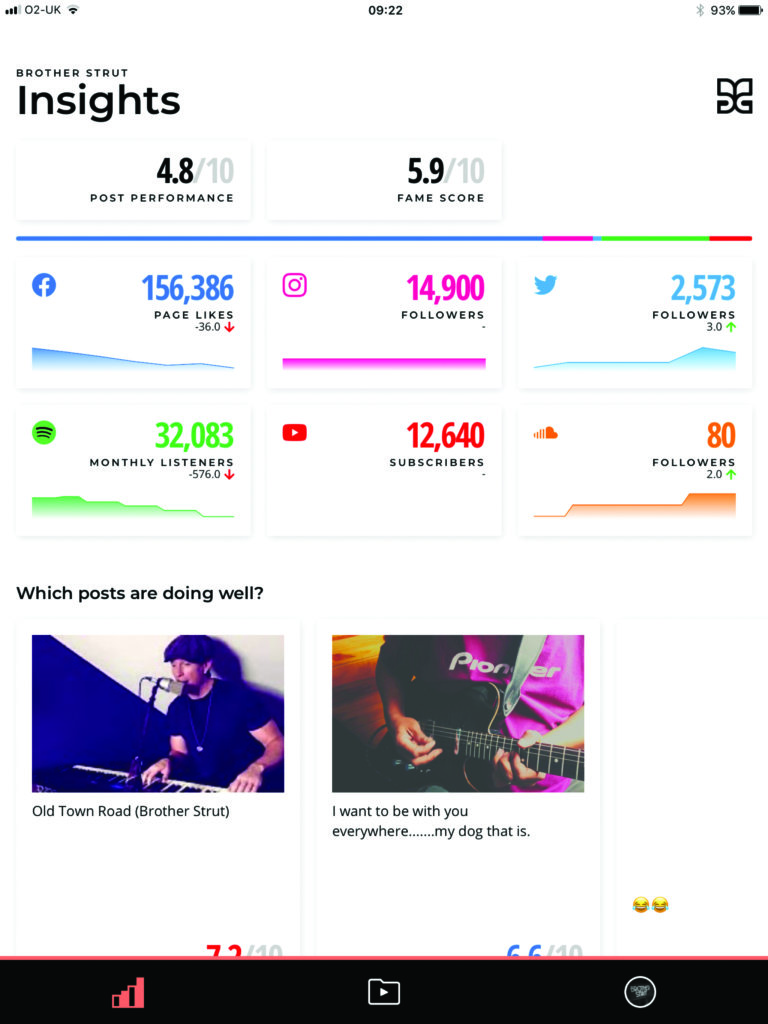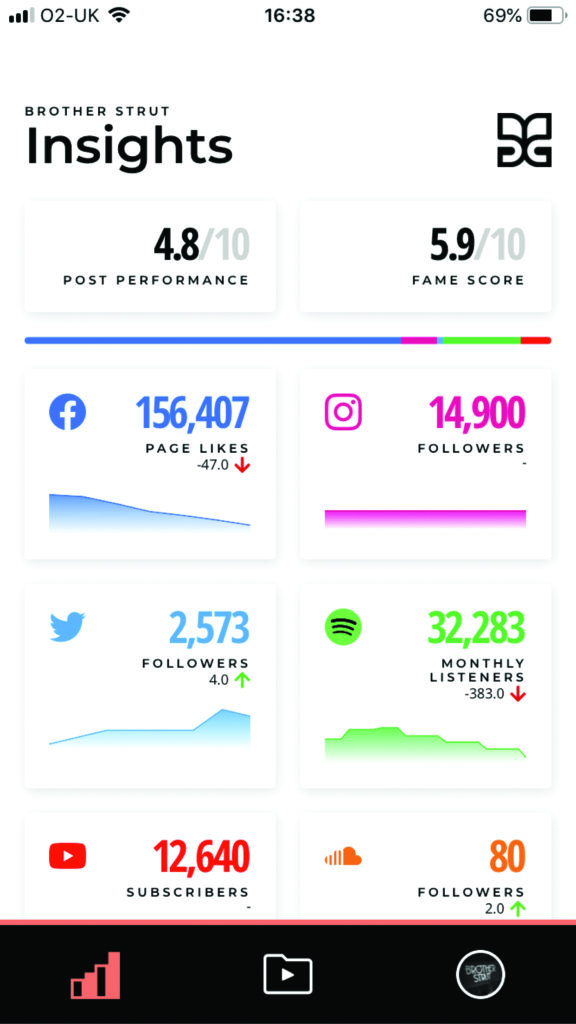Beatchain – A Record Company in a Box

While building a fanbase is important, it can’t be your full time job when you should be writing, recording, and playing live shows – you know, doing the actual music. But in this AI and algorithmic world, there’s got to be a way to harness technology to do some of this for you, right?
Beatchain may just be that solution that independent artists can use to not only monitor and guide their growth online, but also serve the fans they have more efficiently and create deeper connections. I spoke to Ben Mendoza (CEO and co-founder) and Steve Jones (Creative Director and co-founder) about the new data-driven music world and how independents can utilize the same AI and ML tools the big guys do.
Is this a social media growth platform, distribution partner, or artist portal?
Steve: Record company in a box. We are aiming to offer a complete suite of tools all provided in one place. We are not at war with majors, there is a ton of value in A&R. But to get to that level if you want to be signed, it becomes a lot more about running a business at some point. We get up and coming artists on the map, take fairly known ones and help them grow bigger. From there, they can make the decision whether to trade some control for a smaller share of the pie. But this puts the control in their hands.
Ben: Music industry in the box is a great way to put it. Everything from social media growth to online advertising, distribution to email campaigns. We are a big piece of the jigsaw, providing tools that save an enormous amount of time all in one place. When resources are precious, like for most independents, you really have got to make the most of what you do but be efficient. Using multiple platforms is a disjointed experience and can be very expensive…Beatchain is everything in one place.
The first thing you do when you sign up for Beatchain is connect all of your social media and streaming profiles within “Insights;” explain why that process is important.
Ben: This is how we can benchmark where you are at online and begin to help guide your process to growth. Take, for instance, when you connect your Spotify profile, you can see where your fans are, you can see the artists you are like, you can also see affinities in the fan sets. Fans that like you and another artist can find fans that drink a certain beer, or show. It can amplify your engagement with those fans.
Steve: We’re focused on what we can offer the independent community vs. the record industry. Majors usually hold all of the streaming data: the fans, their locations, and so on. They also have comparative data of many artists on the label they can leverage for new ones. We are joining up all those different data points into one dashboard. Your mailing list, your social, your streams and more, all in one place. and it starts with Insights.

Musicians sometimes glaze over with talk about AI and ML and comparative targeting. How does it specifically work on Beatchain?
Ben: We sort of do two things. When we do the comparisons, we do try to pick people similar (size of following) and we also look for the next level of artists for the type of music you do and the types of fans that will be receptive. That way we can analyze which posts are being more successful and identify how to target those fans. The platform can see that, for instance, this type of post is getting more traction vs. another one at these times of days. The second thing is to really help artists by providing templates, tips, and scheduling, even help in promotions. The key to discovery is getting your music in front of the right people who are open to your music, not just any people.
In terms of data sharing, this seems very powerful in terms of tour planning if you can isolate fan communities by region. How can artists’ managers and promoters take advantage of that? Is the data shareable with talent buyers?
Ben: We’re building the manager view internally at the moment, might be sexier at release. So, you could have an array of all your artists, all in one view. You could do comparisons on all of your acts, and take action from that data. The more info that is gathered, the clearer the decisions can be.
Let’s talk about Launchpad. This is a really cool area where artists can manage their social media posts.
Ben: There is quite a difference between getting a “like” and getting engaged followers. We look at things like return visits, time of interaction, engagement. With Beatchain, you can see what is and isn’t working, and then can generate subsequent posts that really drive those engaged followers.
Steve: I think “Tips” in Launchpad is really cool as well. When you click to post, we’ll give you some “best practices” guidelines to help make it easy and quick. We also have an area for a Media Library where you can preload a ton of concert photos and band content for use later on in scheduling posts. It’s all right there in one platform.
Beatchain is offering distribution services. Are you doing direct music distribution to DSPs or is this a 3rd party partner?
Ben: We signed a deal FUGA as our preferred partner, but Beatchain will be handling the frontend. We plan on doing the whole run: profile setup for new artists, ISRC codes, everything. We are rolling out to the 15 major DSPs, but not all of them. Again, we want to be efficient and optimize the experience first.
What do you guys think about releasing singles vs. albums? Should artists be releasing more or less?
Ben: Beatchain can help you determine that and then you can make the best decisions on how often or how much to release.

Steve: Once you can master your fanbase and keep the ones you have engaged while growing new ones, the value to it is long-tail. The more material you put out, the more they keep streaming, but you must own everything. You must own the cycle and control. It’s a volume thing, same as going back to venues as a live act. There is no reason why three-year-old albums can’t become surprise successes now. It’s really just about connecting those people.
When you go out on tour, you have to find a legitimate reason to reinvigorate that catalog. Most of the world hasn’t heard that song. There’s this mindset that we need to move on to something else, ‘we released that in 2012.’ No, making sure people know about your older work is important, too. Invigorate those assets, make sure you direct people to it on social.
Give us a little info on Fanbuilder. Any other features coming that you can hint about?
Ben: Yes, we’re really excited and already testing it, slated to release it in early 2020. Fanbuilder is a way to utilize our expertise in platform advertising to focus your efforts in gaining the right kinds of fans. Another cool feature is Campaign Manager. We are providing templates on how to release an EP, how many weeks out, what kinds of content to use to promote it. This is sort of a mixture by integrating ads, promoting artist profiles and getting more fans and engagement.
Steve: We are able to create a whole range of ad groups, things you include and exclude for targeted audiences. The software understands the parameters in terms of locations, likes, genres, demographics, it will take and test hundreds of different ad sets. We are making it cost effective. Take a small piece of your budget, could be $10/day or even week and it will apply that across hundreds of tests, then take that budget and spend it on the ones that are working and throw out what isn’t working.
Ben: Email management will be coming by the end of the year, too. We want to help artists run multiple campaigns for different reasons–tour, launching an EP, etc.– with templates based on industry experience.
Steve: We are looking at live ticketing, as well. We’ve developed our own ticketing solution, but we can also mix and match with what you already like.
You are experts in building music careers — what is important for indie artists to understand in order to grow and succeed in 2020?
Ben: The old industry way was to advertise through billboards, TV, and radio. You can get traction, but you can’t measure how many people look [at a] billboard. In social media terms you can tell exactly what worked and what will work based on what others are doing. We believe in data, but more importantly, measurement and action. Beatchain is taking the experience of the market and applying that to growing fanbases efficiently while making it available to everyone at every level.
Steve: There has to be a shift for artists to understand that they aren’t special. You have to make an effort to run a business just like any other. A plumber, even if they are great at their craft, can’t go out and expect business to fall at their feet without getting the word out. If you aren’t comfortable with online stuff, you need to learn. Beatchain is trying to make that process easier for all levels of musicians; if you don’t take action nothing will happen.
Sign up for free here: https://Beatchain.com
ABOUT THE AUTHOR
–Michael St. James is the founder and creative director of St. James Media, specializing in music licensing, publishing, production and artist development.
